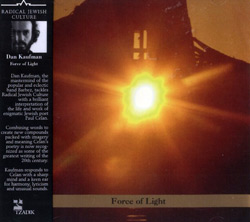
Force of Light, songs that washed up on shore after Jewish poet Paul Celan let himself out onto the waters of the Sienne, are full of tantalizing clues to the vitality and breadth of the latter's memory. Dan Kaufman (aided by a good many others, including Pamelia Kurstin, Danny Tunick, Peter Hiss, Dan Coates, Peter Lettre, and John Bollinger) carve out composed spaces for poems from Celan that evoke the spirit of his mother and the sense of life that was absorbed by the black hole of Auschwitz. Spawned from such events that no one wished to peer at, Celan's poetry often deals with memory, with retaining something of what one seems to interrupt, with internalizing those whose death one must endure. In this manner, Celan brought out an awareness of self through concern for death.
Much as life issued forth from his poems on account of this living with death, so too this recording is something darkly resonant, positively shot through with lighter sonorities. The instrumentation, which consists of violin, cello, theremin, marimba, clarinet, bass, electric guitar, and lap steel guitar, is used sparingly and artfully. Once things have time to settle, it becomes apparent how skillfully Kaufman and the other players have this music under their fingers. The music swings with a tightness and breathless momentum; inspired as they are by the matter at hand, there is a sense of almost instant recognition to the pieces, as the players dig into the subsections in a nearly gleeful manner.
In addition to the vivid and zealous escalations in volume and density, the players spill out from staid pieces of litheness and harmonic control onto rambunctious, festive pieces, thus canvassing a variety of Jewish musical traditions. For certain pieces, however, the security of technique becomes overtly apparent, strangling any and all potential lingering and sonic surprises. That beside, to some surprise, Fiona Templeton's reading of Celan's work leaves something to be desired: each selection is read at the same speed (which is often too fast) and tone (generally flat), not allowing ample opportunity for the words to be savored. At any rate, none of this translates into compositions of especially academic leanings. Force Of Light remains an accessible formulation of a convincing and highly personal vocabulary.
Comments and Feedback:
|



